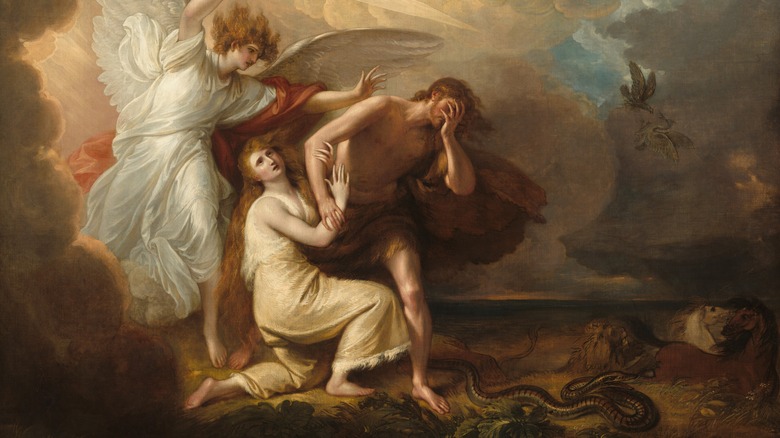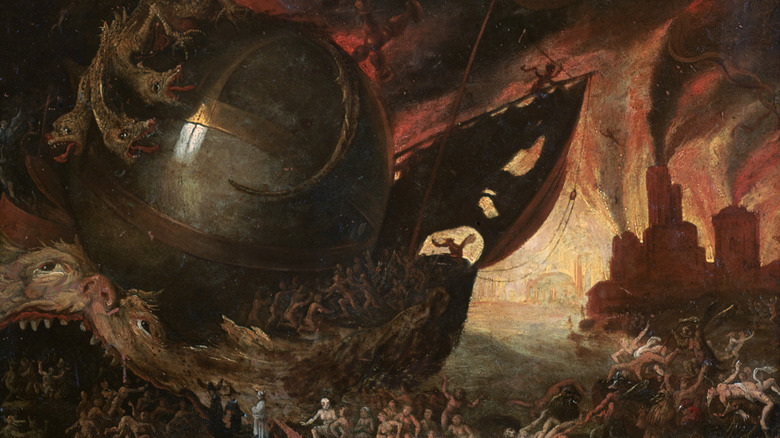The Big Question The Bible Never Answers About Adam And Eve
It's by no means a consensus among denominations that the Bible is to be taken literally. Among others, schools of thought in Catholic, Jewish, and Muslim traditions are perfectly content to take books from the biblical canon as literature or allegory. This applies to the Book of Genesis as much as any part of the Bible, where taking the events of creation as literal truth not only runs against the facts of evolution but invites all manner of questions about populating the Earth that Genesis can't answer.
But there's another question, a spiritual question, that hovers over the beginning of Genesis however it's interpreted. Everyone knows at least the basics of the first chapters: That God, after creating heaven and earth and all manner of living things, made man and woman, Adam and Eve, and set them up in paradise until they fell into temptation and were cast out. In Christian thinking, this puts the stain of original sin on all of humanity (though that concept is not found in Judaism or Islam). In the wilderness, Adam and Eve birthed Abel and Cain — whose act of murder divided the family of man — and many other sons and daughters before Adam died at the age of 800, or so says Genesis 5 (via Bible Gateway).
And what happened to Adam after he died, and to Eve? That is the unanswered spiritual question of Genesis. And, as with the issue of whether Genesis or the Bible is meant to be taken as a literal history, the answer depends on which faith you ask.
Many Christians think Adam and Eve are in Heaven
Nowhere in the Bible does it say what fate befell Adam and Eve in the afterlife. As the progenitors of original sin, their actions have enduring consequences for all humanity in Christian doctrine. As the first humans, they would never have known Jesus. Whether they — or anyone who lived and died before the birth of Christ — knew him is a profound issue in Christianity.
In Catholicism, whether the concept of limbo exists, Adam and Eve presumably went there after death — along with Moses, Noah, David, and other souls — until Jesus descended into the realm of the dead. "The Catechism of the Catholic Church" declares that Jesus "opened heaven's gates for the just who had gone before him." Whether Adam and Eve would be counted among the just, however, is a separate issue. Catholicism considers Adam so — the "Catechism" describes him as a "lost sheep" sought by Jesus.
Other Christians point to various passages in the Bible as indicators that Adam and Eve obtained salvation. Psalms, Romans, and Hebrews discuss the righteousness of patriarchs like Noah and Abraham, the pleasing sacrifice of Abel, and the promise of faith and grace, which many take as evidence for Adam and Eve's place in Heaven. Even Genesis has been cited in support of the idea, with God's gift of clothing taken as mercy and his decrees to man, woman, and serpent taken as a gift of the first gospel to Adam and Eve.
They may have gone to the other place (at least at first)
Another biblical passage cited to support Adam and Eve's being in Heaven is 1 Peter 3: "He was put to death in the body but made alive in the Spirit ...he went and made proclamation to the imprisoned spirits — to those who were disobedient long ago." While some interpret this passage as meaning that Jesus shared the gospel with the dead and offered the path to salvation, others think that 1 Peter confirms that Jesus proclaimed judgment to the dead. In other words, their ultimate fate was already decided and immutable. If Adam and Eve were bound for hell, that was that.
And there are those who believe hell is where Adam and Eve were bound. By bringing sin into the world, they are considered doomed. It's not a popular view, but it is out there. The definition of hell, however, is not consistent across time and denominations. Per Britannica, the word "hell" was originally a generic term for the underworld, the abode of all the buried dead. This fits some conceptions of Sheol, the land of the dead described in the Old Testament. The Old Testament in general has little to say about the afterlife, and Jewish notions of life after death vary.
One tradition holds that Sheol, or hell, or whatever term one prefers, is a holding place for the dead until the coming of the Messiah. Then all souls will reunite with their bodies for final judgment. And some Christians hold that Adam and Eve would have gone to such a hell and been condemned were it not for salvation through Jesus.


